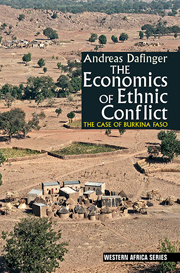Book contents
- Frontmatter
- Contents
- List of Maps
- List of Figures and Tables
- List of Acronyms
- List of Vernacular Expressions
- Acknowledgements
- Dedication
- 1 Introduction
- 2 The logic of global relations: Burkina Faso, Boulgou and the world
- 3 Sharing the land: The ethnic division of labour
- 4 Conflict
- 5 Concealed economies: The hidden dimension of conflict and cooperation
- 6 Conclusion
- References
- Index
3 - Sharing the land: The ethnic division of labour
Published online by Cambridge University Press: 05 October 2013
- Frontmatter
- Contents
- List of Maps
- List of Figures and Tables
- List of Acronyms
- List of Vernacular Expressions
- Acknowledgements
- Dedication
- 1 Introduction
- 2 The logic of global relations: Burkina Faso, Boulgou and the world
- 3 Sharing the land: The ethnic division of labour
- 4 Conflict
- 5 Concealed economies: The hidden dimension of conflict and cooperation
- 6 Conclusion
- References
- Index
Summary
In Boulgou, as in most of rural sub-Saharan Africa, land is a major, if not the major, source of social control. The power to allocate land establishes a social hierarchy and a fabric of mutual dependencies. All parts of society refer to land in some way and are part of a complex field that spans those who hold land (the ‘landed’) to those who do not (the ‘landless’): all groups and individuals in this field are related to each other in terms of their relative entitlement to the land. As opposed to the notion of ownership, which implies an abstract, exclusive right over an undivided whole, one is advised to look at property relations as ‘bundles of rights and obligations’ (e.g., Berry, 1993:133): a flexible, permeable and temporary set of agreements, subject to continuous negotiations, opposed to the allegedly durable and often enough absolute notion of independent, i.e. allodial ownership. The complexity of land rights and property regimes in sub-Saharan Africa has been dealt with in great detail elsewhere (Bassett and Crummey, 1993; Juul and Lund, 2002; Lund, 2001; Moore, 1998; Sawadogo and Stamm, 2000; Shipton and Goheen, 1992 b; van den Bergh, 1996. For Burkina Faso especially: Brasselle, Gaspart, and Platteau, 2002; de Zeeuw, 1997; Hagberg, 1998; Sawadogo and Stamm, 2000).
Most authors underline the dynamic nature of landed relations: entitlements to land and access to landed resources are not fixed once and for all, but depend on a series of criteria that constantly need to be reified (membership in the landholding group; the capacity to actually exploit the land in an appropriate manner and so forth).
- Type
- Chapter
- Information
- The Economics of Ethnic ConflictThe Case of Burkina Faso, pp. 56 - 101Publisher: Boydell & BrewerPrint publication year: 2013

